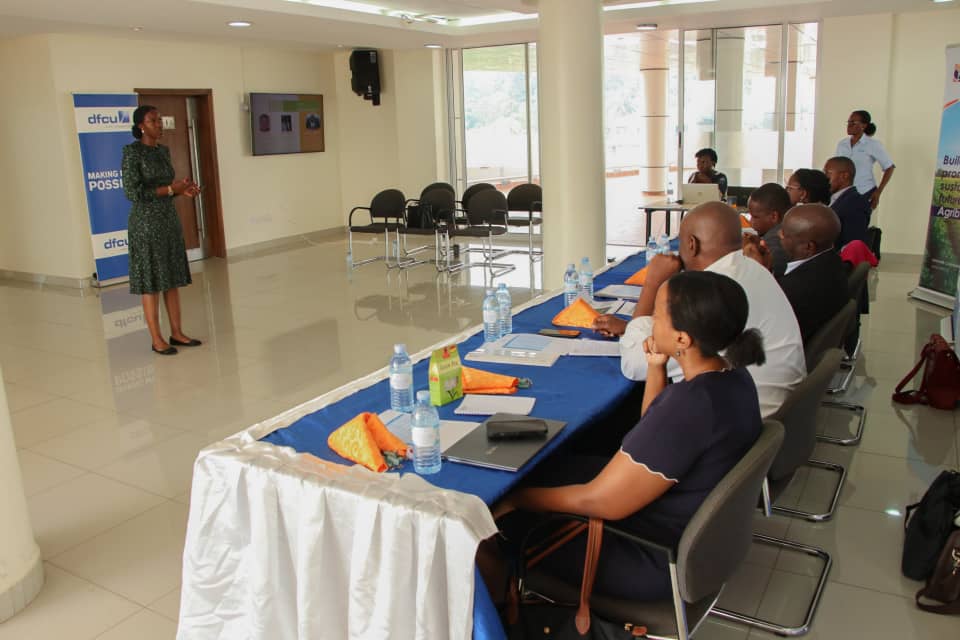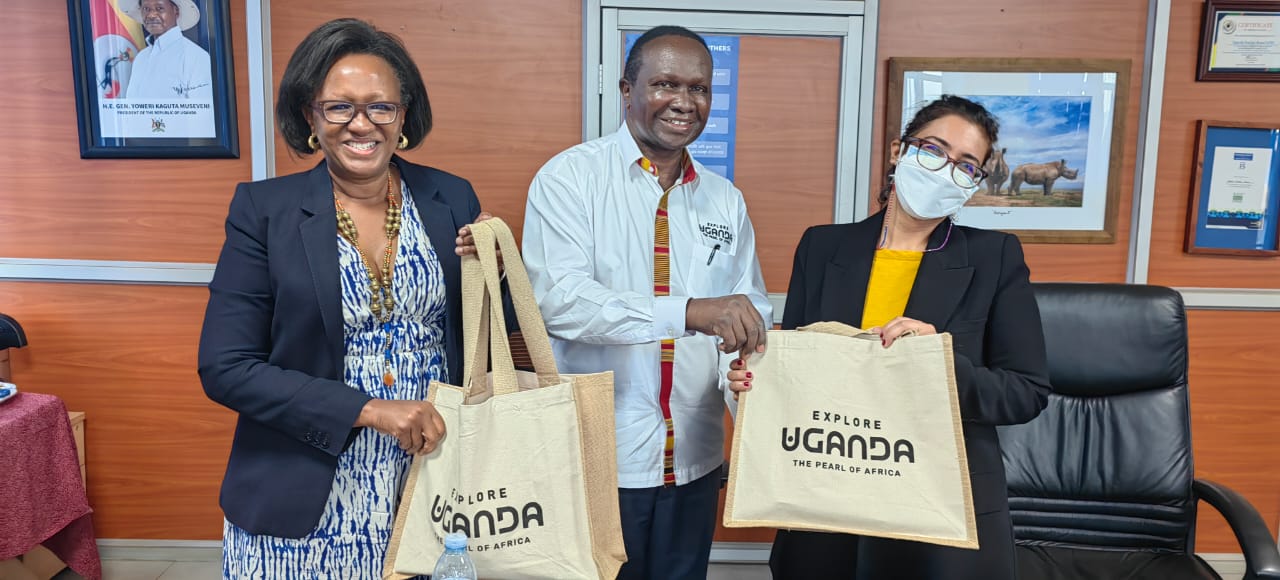In collaboration with DFCU bank and the Rabo Foundation, the Agribusiness Development Center (ADC) held an investor pitching session on Friday at the bank’s Nakasero headquarters in Kampala, Uganda. 22 participants presented their winning business profiles, transactions, and investment plans to a panel of judges, which included Kennedy Ssejemba from Truvalu, Ronald Kasasa, DFCU’s head of business banking, and Pearl Nimusiima from BiD Capital among others.
Participating enterprises included APA Tea Ltd, Golden Basket Ltd, Kisombwa Ranchers, Krystal Ice Ltd, Zunie Agri-Consultancy, Milagro Investments Ltd., Areg Agro Food Ltd, Stella Keitirima Enterprises Ltd, and Pearl Flavored Teas, among others.

Mr. Ronald Kasasa, Head of Business Banking at DFCU Bank, mentioned in his remarks that there have been a number of startups by young people, with a preponderance of interest in agricultural enterprises, with appealing proposals well researched with good management structures, market-out plans, and proper financial planning, but they have only come to the bank to seek support and not money to start from the ground up. This demonstrates a good understanding of agriculture and its potential, which points to the members’ strengthening of capacity by contributing an item that will benefit them as a bank.
According to him, the majority of pitchers have been searching for grants, primarily because of the high cost of funding. Since we have recognized their potential and are confident that they can pay the 12% annual cost of agricultural financing, which is primarily used for capital investments in machinery and equipment, our bank offers a number of products that are affordable, thereby providing our farmers with the affordability they require by increasing their capital at a 15% annual interest rate, which agricultural firms can take advantage of.
He added, “Some may benefit from the grants available and some from the available bank financing, with higher chances to benefit from one of the two offers.” Probably, what may change a bit is the fact that if someone is pitching for US$100,000 and we assess the capacity to absorb a debt or grant as planned is much lower than that, the amount may reduce and also the period of repayment may change depending on the projections of the business and also the outlook of the economy.
Pearl Nimusiima, the senior investment associate at BiD Capital Partners, a financial transaction advisory business provider for companies in East Africa and the Sub-Saharan region, revealed that while some businesses have invested in learning, as evidenced by their participation in this program, the majority of those who presented during the pitching had new ideas and had only been operating between 2018 and 2021.
She said, “Participation in the Business Accelerator programme shows the desire to grow, as some even have reasonable cash flows.” Although the biggest challenge some of the businesses have is profitability, having been affected by the COVID-19 pandemic and Ebola that followed, they are trying to pull their weight to grow their businesses and profitability going forward.
“Three of the businesses that have been heard about so far today at face value would be ideal candidates for financing,” she continued. “However, even those that aren’t able to clearly explain their finances can do so when it comes to their business model, strategy, and plan. Once those things are in place, which are ready to be fixed as they walk alongside someone, then they can be ready to raise the capital.” The main obstacle is that some companies cannot afford the capital since they cannot pay the interest and other costs if they are not profitable, which is why many people say they would rather have grants than debt.
The CEO of Pearl Flavoured Ltd., Grace Wako Katuramu, stated that ADC has given them support, training, and exposure to companies and production processes.
She stated, “We are now selling our green teas thanks to DFCU bank and the Agribusiness development centre, and to the training we attended, we have been able to come to this position. Following the practical, hands-on training, we continued to build up to this stage. With the plan and funds readily available, I am confident that I will be able to boost production and even break into the market with confidence in the calibre of our products.
Criteria for Selection
The pitcher’s business plan, ability to take on debt from additional financing they are seeking, the viability of the business and the transaction they want the bank to finance, impact on the economy and communities they serve, and environmental and social governance surrounding the business are all important factors. The criteria for selecting the best pitchers depend on how each one has presented their business, and each judge has their own standards for scoring. DFCU as a bank has its own standards for rating based on the risks and opportunities, and the grantors also have their own standards, so the bank’s assessments are very different. Nevertheless, the main considerations are whether the transaction is viable and the pitcher’s interview presentation.
According to DFCU’s agricultural strategy, the industry is one of the bank’s priority areas among the many risk and financing options accessible for agricultural SMEs. The bank works in collaboration with risk partners to make the pricing for agro traders attractive and offer a variety of products for those engaged in agribusiness firms. At the end of the day, they can at least place some margin bets.
On 11 August 2022, the Agribusiness Development Center introduced its Business Acceleration Program to its partners and stakeholders. The accelerator programme was initiated by DFCU Bank and Rabo Foundation to help 350 agribusinesses (40 per cent of which are run by women) become self-sufficient, generate new employment, and connect at least half of these agribusinesses to capital and markets.
By providing them with a chance for business acceleration, this initial cohort aimed to draw women-led agribusinesses and help them get past the ideation stage.
Every week from October through December, several knowledgeable and experienced trainers delivered training sessions on various topics related to agribusiness management and acceleration, including creating a model canvas, marketing, financial management, and risk management, to name a few. They would learn how to manage growth for pertinent linkages and self-sufficiency, as well as how to validate their business models and better comprehend their operating environments and strategic business positioning.
DFCU Bank, Truvalu, Plus Plus, United Social Ventures, and BiD Capital were represented by a panel of six judges who heard pitches from the women-owned enterprises on Friday. The goal was to draw investor companies for funding possibilities and/or connections to finance.
About Guide2Uganda
Guide2Uganda (www.guide2uganda.ug) is the most comprehensive source of travel information about Uganda that exists on the web, with more content on its cities & towns, accommodation, attractions, events, museums and galleries than any other online guide that
currently exists for Uganda; as well as being a dynamic travel news and events
driven site with fresh content added daily.
According to WeFollow & Peer Index (that measure online influence), we are among the most influential online media organizations in Uganda. Guide2Uganda was also awarded ‘’Best Destination Website in Uganda’’ by Jumia Travel Uganda in the 2018 Africa Travel Awards.
Share your travel stories & photos with the world via email: info@guide2uganda.ug




